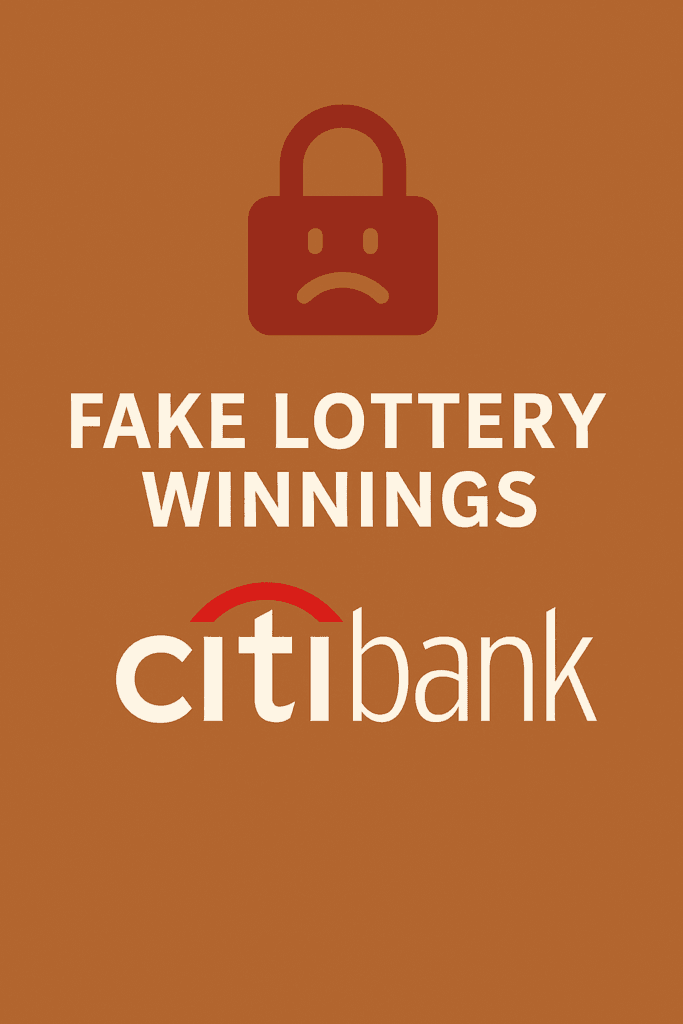Online scammers are always innovating, blending corporate legitimacy with outlandish claims to lure victims. One of the latest phishing attempts making the rounds involves a fraudulent email claiming to be from Citibank Canada offering an incredible $8.5 billion Coca-Cola lottery winning. While the amount may seem ridiculous, the scam is layered with psychological tactics and false urgency designed to trick recipients.
In this blog post, we’ll break down the full scam, analyze the red flags, and show you how to protect yourself from similar schemes. We’ve included the full original email for SEO and educational purposes.
The Scam Email in Full

From: Chairman/CEO [email protected]
Sent: 11 April 2025 07:32
Subject: Does it mean that you are no longer interested to claim your outstanding,
Citibank Canada
Citigroup Place
123 Front Street West,
Suite 1900, Toronto, Ontario M5J 2M3.
Attention Dear:
Once again I am writing this E-mail message to ask you; does it mean that you are no longer interested to claim your outstanding Coca-Cola winning valued at a total sum of $8.5 Billion US Dollar or are you not receiving our notifications E-mailed?
However; your response will determine your interest. Failure to comply with the remaining payment of $49 immediately is a confirmation that you have rejected your fund and our noble Bank will have no other option than to allow the Canadian government to use the fund for this homeless project as they are threatening to do since.
Keep in communication with below Email [email protected] addresses,
TELEPHONE: +176571239 (S.M.S) only for record purposes.
And don't forget you are permitted to send it through gift cards either by “Steam card" OR "iTunes Apple cards OR Bitcoin wallet Address OR USDT-TRC20
Signed.
John Hastings
Chairman/CEO
Citibank Of Canada
Why This Email Is a Scam
Let’s dive into why this is a classic phishing and advance-fee fraud attempt.
1. Too Good to Be True
Winning $8.5 billion USD from Coca-Cola is completely unrealistic. Even legitimate international lotteries never award such sums, and companies like Coca-Cola don’t run sweepstakes this way.
2. Poor Grammar and Sentence Structure
The email contains multiple grammatical errors and awkward phrasing:
- “Notifications E-mailed?”
- “…as they are threatening to do since.” These inconsistencies often indicate non-native English speakers writing in bulk from scam syndicates.
3. Suspicious Email Address
The message comes from [email protected] — not a Citibank domain. A legitimate institution like Citibank Canada would never send financial communication from a Thai academic domain.
4. Pressure to Act Fast
Scammers frequently create a sense of urgency. In this email, you’re told that failing to act immediately means your money will be donated to a government homeless project.
5. Requests for Untraceable Payments
You’re asked to send $49 through gift cards, Bitcoin, or USDT, which are untraceable and irreversible. No legitimate bank would ever request payment this way.
Common Tactics Used in This Scam
- Emotional Manipulation: Using a massive payout to entice victims.
- False Authority: Fake names like “John Hastings” and fake positions (Chairman/CEO) to build credibility.
- Threats of Forfeiture: Claiming the money will be given to the government if you don’t act immediately.
- Limited Contact Methods: Scam email and SMS only, no verifiable phone support.
Red Flags Checklist
✅ Generic greeting (“Attention Dear”)
✅ Outlandish prize amount ($8.5 billion)
✅ Payment required upfront ($49)
✅ Gift card or crypto payment requested
✅ Suspicious email address
✅ Urgent tone and threats
✅ Grammatical errors
✅ Fake authority figures
Who Are They Targeting?
Scams like this often target:
- Elderly individuals
- People struggling financially
- Users who have interacted with previous scams
- Those unfamiliar with digital scams or online security
By mimicking legitimate institutions like Citibank, these scammers hope to trick less skeptical recipients into complying with demands.
How to Protect Yourself
- Never Send Gift Cards or Cryptocurrency to Strangers
- No legitimate business requests payment in these forms.
- Always Check the Email Address
- A real company uses verified domains like
@citibank.com.
- A real company uses verified domains like
- Verify Claims with Official Sources
- Contact the real organization directly using their official website or contact details.
- Don’t Click Suspicious Links or Respond
- Replying even once can lead to more targeting or shared personal information.
- Use Spam Filters and Report Emails
- Report scam messages to your email provider and national cybercrime unit.
Where to Report These Scams
Depending on your location, here are official places to report scam emails like this:
- USA: FTC Report Fraud
- UK: Action Fraud
- Canada: Canadian Anti-Fraud Centre
- Australia: Scamwatch
- Europe: Contact your national cybercrime unit or consumer protection agency
Conclusion: Stay Alert
The Citibank Coca-Cola lottery scam is nothing more than an elaborate ploy to steal your money. With fake identities, untraceable payment methods, and false promises, the fraudsters attempt to manipulate people into parting with small fees — often repeatedly.
If you receive an email like this:
- Don’t reply
- Don’t send money
- Report it immediately
And always remember: If it sounds too good to be true, it probably is.
Need More Scam Warnings?
Visit FraudExpose.com for more real-world scam breakdowns and tips on how to stay safe online.
